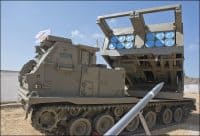
Boeing Co. (NYSE: BA) reported first-quarter 2016 results before markets opened Wednesday. The aerospace company posted adjusted diluted earnings per share (EPS) of $1.74 on revenues of $22.63 billion. In the same period a year ago, the company reported EPS of $1.97 on revenues of $22.15 billion. First-quarter results also compare to the Thomson Reuters consensus estimates for EPS of $1.83 and $21.44 billion in revenues.
Adjusted earnings include the negative impact of a $162 million pretax charge against the company’s KC-46A military tanker program and a $70 million pretax charge to the 747 program. Excluding the charges, Boeing’s first quarter earnings would have hit $1.98 per share. On a GAAP basis, EPS came in at $1.83.
Boeing delivered 176 new commercial jets in the first quarter, down 4% year over year. Revenues in the commercial airplanes division were down 6% and earnings were down 36%. Operating margin for the quarter fell by 3.3 percentage points to 7.2%. Boeing booked 121 net new orders in the first quarter, and the division’s backlog counts more than 5,700 planes with a value of $424 billion (at actual sales prices, not list prices).
Operating cash flow totaled $1.23 billion in the first quarter and free cash flow totaled $483 million.
The company added about $140 million in deferred production costs for the 787 program. That means that Boeing is still losing money on every 787 it sells. Deferred production costs now total $28.65 billion, but growth continues to slow down.
Sales of military aircraft rose 34% year over year in the quarter to $3.66 billion and revenues for the company’s defense and space division rose 19% overall. Earnings were up 11%, even though operating margin slipped 0.8%.
Boeing reaffirmed its full-year 2016 forecast calling for $93 billion to $95 billion in revenues, adjusted EPS in a range of $8.15 to $8.35, and operating cash flow of about $10 billion. The forecast for commercial aircraft deliveries remains at 740 to 745, down from 762 deliveries in 2015. Capex is forecast at about $2.8 billion.
CEO Dennis Muilenburg said:
Higher year-over-year deliveries of military aircraft and continued solid operating performance on core production programs drove revenue growth and strong cash flow for Boeing in the first quarter. …
Overall, we are pleased with our performance trends and our outlook for the year remains positive. On the tanker program, we are making the investments necessary to meet our customer commitments, deliver the initial production aircraft on schedule, and transition the program into full production.
During the quarter Boeing repurchased 28.6 million shares of stock for $3.5 billion and paid $700 million in dividends. The company’s dividend yield this morning is 3.33%.
The company said nothing about plans for a new 737 MAX stretch version or about a middle-of-the-market replacement for the 757.
Boeing also had nothing to say about an order from Delta to replace the airline’s 25-year old fleet of MD-88s. Maybe Boeing is saving that for the conference call, but this looks to us like more evidence that the order is going to Bombardier. On Tuesday the Canadian maker moved its reporting day to Thursday, April 28, one day earlier than previously scheduled. Bombardier’s stock jumped more than 10% on the Toronto exchange and could jump again Wednesday on the lack of any announcement from Boeing.
All in all, the first quarter may best be characterized as tepid. Charges on the tanker program keep mounting and deferred production costs on the 787 program appear to be never-ending. Cash flow is much better than the first quarter of 2015, however, and the company maintains its commitment to returning cash to shareholders.
The stock traded down about 1% in Tuesday’s premarket, at $131.94 in a 52-week range of $102.10 to $150.59. The consensus price target is $138.47.
Get Ready To Retire (Sponsored)
Start by taking a quick retirement quiz from SmartAsset that will match you with up to 3 financial advisors that serve your area and beyond in 5 minutes, or less.
Each advisor has been vetted by SmartAsset and is held to a fiduciary standard to act in your best interests.
Here’s how it works:
1. Answer SmartAsset advisor match quiz
2. Review your pre-screened matches at your leisure. Check out the advisors’ profiles.
3. Speak with advisors at no cost to you. Have an introductory call on the phone or introduction in person and choose whom to work with in the future
Thank you for reading! Have some feedback for us?
Contact the 24/7 Wall St. editorial team.
 24/7 Wall St.
24/7 Wall St.



